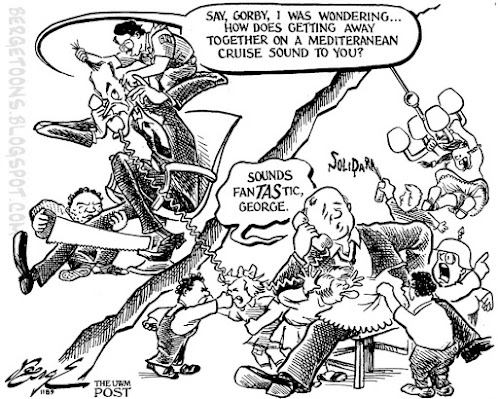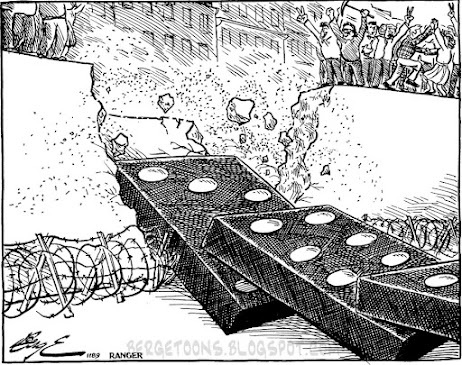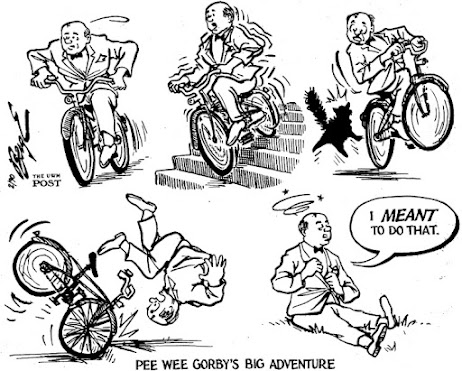Mikhail Gorbachev, the last President of the Soviet Union, died this week, age 91; so for today's Saturday History Tour, here are some of my cartoons of one of the most transformative leaders of the latter half of the 20th Century.
 |
| in UW-Milwaukee Post, Nov. 14, 1989 |
With his election by the Politburo in March of 1985, Gorbachev became the USSR's fourth leader in as many years. Leonid Brezhnev's ill health had been kept secret for years before his death in 1982; his successor, Yuri Andropov, was felled by kidney failure after 15 months in office, aged 69. Konstantin Chernenko, a heavy smoker, was at death's door almost from the start of his 13-month administration, and died of emphysema and complications at the age of 73.
 |
| in UW-Parkside Ranger, March 21, 1985 |
Gorbachev came to power eager to make his mark. He signaled his willingness to negotiate arms limitations with the United States, a topic whose progress had ground to a halt after Ronald Reagan scrapped the talks begun under Brezhnev with Gerald Ford and Jimmy Carter.
 |
| in UW-Parkside Ranger, April 10, 1986 |
The West added two Russian words to our vocabulary under Mikhail Gorbachev: perestroika (restructuring) and glasnost (openness). The former was actually a policy begun under Brezhnev in 1979, but to which Gorbachev announced a renewed and firm commitment. His reforms decentralized governance and economic controls while lifting some of the secrecy enjoyed by Kremlin bureaucrats.
 |
| in UW-Parkside Ranger, Sept. 7, 1989 |
What Gorbachev hadn't factored in was the desire of the citizens of Soviet client states and some non-Russian S.S.R.'s to break away from Moscow entirely. It's not as if independence movements were unknown; Poland's Solidarność movement had been a headache for the government in Warsaw since 1980, and memories lingered of Moscow's brutal suppression of revolts in Czechoslovakia (1968), Hungary (1956), and East Germany (1953).
 |
| in UW-Milwaukee Post, Nov. 9, 1989 |
When the Soviet empire in Eastern Europe completely collapsed in November and December of 1989, there were too many dominoes falling at once for Gorbachev to seriously consider sending the Russian military into every countries quitting the Warsaw Pact.
 |
| in UW-Parkside Ranger, Nov. 16, 1989 |
Rough seas for Gorbachev's Mediterranean summit meeting with U.S. President George H.W. Bush were the perfect metaphor for the Soviet leader's predicament.
 |
| in UW-Milwaukee Post, Dec. 5, 1989 |
(This was months before Bush would throw up into the lap of the Japanese Prime Minister, by the way.)
 |
| in UW-Milwaukee Post, Feb. 20, 1990 |
I still like this take-off on a scene from Pee Wee Herman's Big Adventure, even though you could plug just about any politician going through a rough patch into this scenario. Similarly with this next cartoon.
 |
| May, 1990. Unpublished? |
Reunification of Germany certainly horrified the elder members of the politburo; Gorbachev was also old enough to remember World War II. This, as much as any other single factor, led to the hardliners' attempted coup in the summer of 1991.
 |
| August, 1991. Unpublished? |
The coup met sturdy resistance from their own citizens. Moscow Mayor Boris Yeltsin emerged as the hero of the moment, representing liberalization beyond what Gorbachev had ever intended.
 |
| in UW-Milwaukee Post, Sept. 9, 1991 |
The end of the Soviet Union happened over Christmas break at the UW-M Post, and I don't have any cartoons about Gorbachev after that.
The memorial cartoons I've seen this week have all credited Gorbachev with bringing his country out of the oppression of the communist regime. Many have contrasted him favorably with Vladimir Putin, who has imposed a new oppressive regime of деконструкция and закрытость, and clearly believes that Gorbachev's administration was a disaster.
I have not yet seen how any Russian cartoonists have responded to Gorbachev's passing. Are memorial cartoons even a thing there? If so, was Mikhail Gorbachev someone you can praise under Putin's regime without buying a one-way ticket out a sixth-story hospital window?
No comments:
Post a Comment